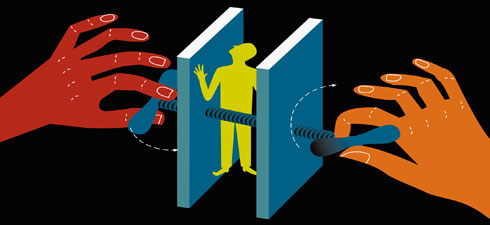Even if it seems highly improbable today, there may come a time when the European Union no longer exists. The crisis that it is now undergoing is the worst that it has ever experienced. Not since the 1970s has the economic climate been so strained, nor has the outlook been so grim — at least not since the end of the Second World War.
Prague may not be responsible for the conflicts that are now tearing at the heart of the Europe, but it is certainly a supporter of divisive forces which are growing ever more powerful while the cohesion of the Union is increasingly in doubt. The disappearance of the Euro, which has now become something of a running joke in the Czech Republic, will herald nothing less than the end of the EU as we know it today.
The wounds of the past
At the same time, the United States, which is in the process of losing its global superpower status, has neither the strength nor the inclination to continue to hold up a protective umbrella over Europe. In the final analysis, the enduring presence of NATO, which appears to be as unshakable as the European Union, may prove to be entirely imaginary.
If the disappearance of the EU and NATO put an end to the two main structuring forces in this part of the world, Central Europe would once again become a geopolitical space caught between Germany and Russia. At that moment, the fact that this region has yet to come to terms with the trauma caused by WWII and even WWI, and continues to brood over the injustices and excuses for crimes it was forced to witness, would prove to be a critical problem.
For proof that we have still to recover from the wounds of the past, look no further than the recent official visits by Russian President Dimitri Medvedev and German President Christian Wulff. The main purpose of the Medvedev visit to Giant Mountains on the Czech-Polish border was to attend a commemoration of the Katyn Massacre, which involved the execution of an estimated 22,000 Polish prisoners of war in 1940 — an occasion marked by the presentation of an official apology from the Russian parliament and the handing over to Polish authorities of archive documents on the dead soldiers and their executioners.
A diplomatic airbag
For similar reasons, the German president came to pay his respects at the monument to the Warsaw Ghetto Uprising, exactly 40 years after the then German chancellor Willy Brandt spontaneously fell to his knees at the same spot — a gesture which heralded a thawing in the hitherto glacial relations between the Federal Republic of Germany and communist Poland. On the occasion of their 6 December meeting, the Polish Prime Minister Donald Tusk and the German Chancellor Angela Merkel decided to entrust their respective foreign ministers with a mission to prepare a German-Polish declaration, along the lines of the German-Czech Declaration on the Sudeten Germans, which was drafted more than ten years ago — a document which has the potential to reduce the impact of divergent interpretations of the past by Prague and Berlin to the point where it functions like a diplomatic airbag.
That this “management of the past” is at last possible and that it is taking place when we are still under the protection of the EU is is an immensely positive development: because only definitive recovery from the trauma left by the crimes of the WWII (a war which for the Czechs began with the 1938 Munich Pact) will allow us to create a climate in which we can survive the crises that may undermine the EU in the future.
As a Slovak financial expert recently remarked, the Slovak government should develop a plan that takes into account the potential collapse of the euro zone and a return to the Slovak crown. By the same token, Central Europe should also have in reserve a plan to enable it to survive the disappearance of the two major structures — the EU and NATO — that guarantee its continuing autonomy.
Settlling differences with our neighbours
The first stage in the preparation of such a plan is to settle differences with our neighbours, and that means that we should come together with them to commemorate the wars and the other tragic events that have marked our history, which until now we have remembered in isolation.
We will not be able to consider that the last century has been definitively been “laid to rest” until we see the Polish Prime Minister, the German Chancellor and the Russian President participate in a joint ceremony at the site of the Seelow Heights Battle, which occurred just before the fall of Berlin. When that happens, it will be clear that the memory of victory and defeat pales in comparison to the regret for the men who fell in combat. Let’s hope that this moment can come to pass while Central Europe still benefits from the protection offered by the European Union. Thereafter we will be able to look more serenely on the future of Central Europe.
Was this article useful? If so we are delighted!
It is freely available because we believe that the right to free and independent information is essential for democracy. But this right is not guaranteed forever, and independence comes at a cost. We need your support in order to continue publishing independent, multilingual news for all Europeans.
Discover our subscription offers and their exclusive benefits and become a member of our community now!












